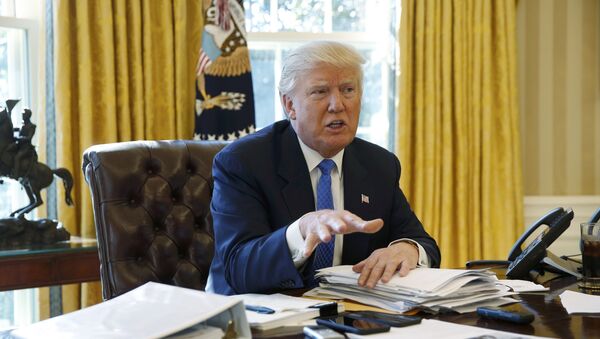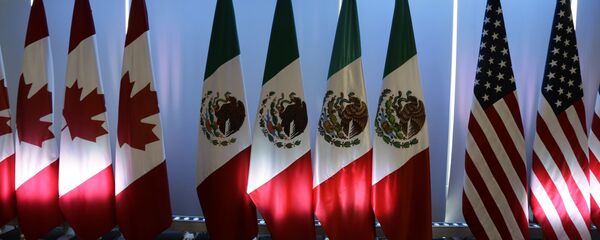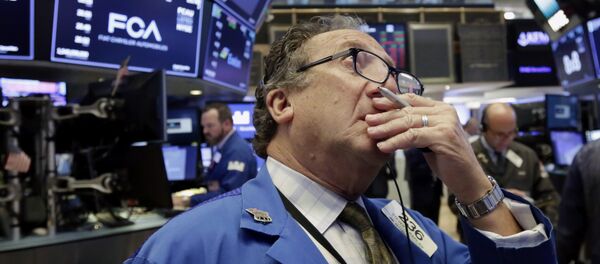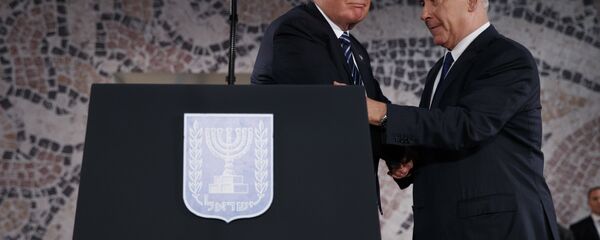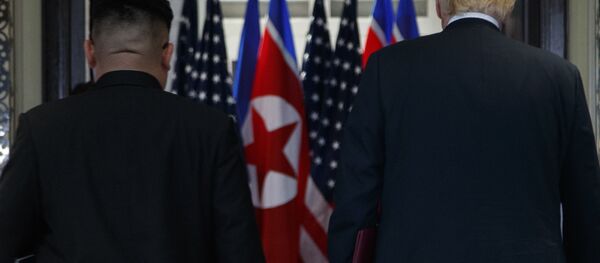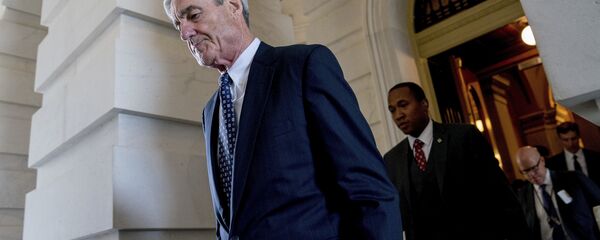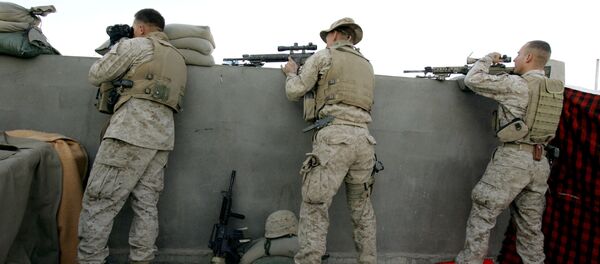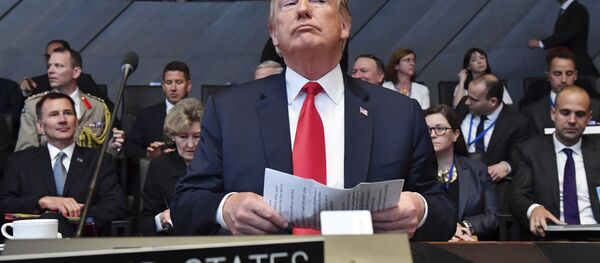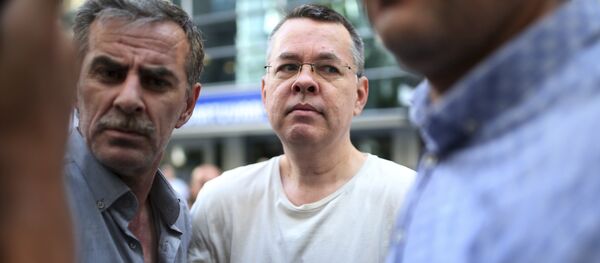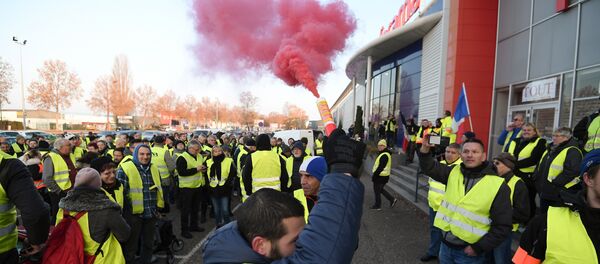Over the past two years, US President Donald Trump has shown that he is determined to follow through with his campaign promises and continue pushing forward his America First approach in the global arena.
Nothing Personal, It's Just Business: Fighting Tariff Wars & Killing Trade Deal
Trade relations have been of particular importance for Trump as a former businessman. He's been trying to either renegotiate or cancel such deals in a bid to achieve more favorable trading conditions and arrangements for the United States.
Executing a campaign promise, Trump directed the Office of the US Trade Representative to pull the US out of the Obama-championed "disastrous" Trans-Pacific Partnership (TPP) just days after being sworn-in.
The same fate has befallen the 1994 NAFTA deal, which Trump also pledged to renegotiate in order to address the US' trade deficit in goods, eliminate unfair subsidies and bringing manufacturing jobs back home. He fulfilled this promise, too, having replaced it with a new trilateral deal — the US-Mexico-Canada Agreement (USMCA) after a year of intense talks.
In line with his America First narrative, President Trump refused to put up with what he consistently described as "unfair trade practices" by China, opting to slap 25 percent tariffs on up to $50 billion worth of Chinese goods in June 2018.
Beijing accused Washington of initiating a trade war and threatened to retaliate with tit-for-tat measures.
The Trump administration threatened to up the ante, warning it would impose an additional 10 percent tariff on another $200 billion worth of Chinese imports if Beijing went ahead with its retaliatory measures. It didn't take the Chinese government long to provide a mirror response.
On the sidelines of the G-20 summit in Buenos Aires in December 2018, the two economic superpowers secured a 90-day trade war truce; Trump agreed not to raise tariffs on $200 billion worth of Chinese imports from 10 percent to 25 percent starting on 1 January, while Chinese President Xi Jinping committed to purchasing more US goods to cut the trade deficit.
Talks with China are going very well!
— Donald J. Trump (@realDonaldTrump) 8 января 2019 г.
But China was by far not the only country in focus — "traditional" US allies didn't escape the 45th president's controversial trade protectionist policies. Trump appeared to be serious about no longer letting anyone "take advantage" of the United States, as he imposed 25 percent and ten percent tariffs on steel and aluminium imports from the European Unions and Canada, respectively.
READ MORE: EU Presents Plan for 'Limited' US Trade Deal — Reports
This move prompted the targeted countries to respond in turn.
Relocation of US Embassy to ‘Eternal Capital' of Israel
Delivering on yet another campaign promise, Donald Trump made a historic decision which changed the political landscape of the Middle East by moving the American Embassy in Israel to the "eternal capital of the Jewish people, Jerusalem".
On 6 December 2017, the US president officially recognized Jerusalem as the capital of Israel and announced that he had instructed the Department of State to initiate the process of the embassy's relocation from Tel Aviv to the newly recognized capital.
While the announcement was unsurprisingly warmly received in Israel, it fueled tensions in the tumultuous region, sparking the indignation of Arab nations, who warned Trump against jeopardizing the peace process in the Middle East.
This has proven to be a major stumbling-block in the international community's efforts to implement a two-state solution, which envisages an independent State of Palestine alongside the State of Israel, west of the Jordan River.
The official opening ceremony of the new US Embassy in Jerusalem was held on May 14, 2018, prompting waves of protests and bloody clashes between Palestinians and the Israeli Defense Forces (IDF) in the Gaza Strip, resulting in the death of at least 55 protesters.
Countering Iran
The Joint Comprehensive Plan of Action (JCPOA), commonly known as the Iran nuclear deal, was signed in 2015 by Iran and the P5+1 nations — Russia, the US, China, France, the UK plus Germany — after years of negotiations. The multilateral accord sought to curb Iran's nuclear ambitions in exchange for the gradual lifting of economic sanctions on Tehran.
READ MORE: Tehran to Pompeo: 'US Brings Chaos Whenever, Wherever It Interferes'
Since taking office, Trump has consistently criticized the Obama-era pact, describing it as an "embarrassment" and one of the worst deals the United States has ever signed up to.
He threatened to unilaterally withdraw from the deal on multiple occasions, with his administration stressing that the president wanted to fix the "egregious flaws" of the "horrible, one-sided" agreement.
The re-introduction of sanctions against various Iranian industries — including shipping, energy, and financial services — was doubled down by Trump's threat to impose secondary restrictions on foreign companies engaging in trade with Iran, thus driving out a significant number of firms from the Iranian market.
Following the US pullout, EU member states demonstrated their interest in maintaining trade ties with Tehran despite the threat of penalties. The EU updated its Blocking Statute to in a bid to shield European companies from Washington's secondary sanctions.
North Korea: From ‘Fire & Fury' to Historic Handshake and More
The path to talks on the denuclearization of the Korean peninsula between Trump and Kim Jong-un, which marked the first time that a sitting US president ever met with a North Korean leader, has been quite precipitous.
Since the leader of the world's most secretive state threatened to launch ballistic missiles into the waters around the US naval base in Guam in August 2017, the POTUS issued a stark warning to unleash "fire and fury" on Pyongyang.
Trump, who has developed a certain reputation for being extremely creative when it comes to nicknames, branded the North Korean leader a "rocket man" on a "suicide mission", while Kim hit back calling the POTUS a "dotard" exhibiting "mentally deranged behavior". As the North Korean leader warned Trump about Pyongyang's nuclear capabilities, the US president even insisted that his "nuclear button" was "much bigger and more powerful", and it actually worked.
Still, despite the "never-ending" war of words, Trump claimed that he "tried so hard" to be Kim's friend — and his tweets were indeed prophetic given the special bond the two have developed during their first summit.
The two heads of state held landmark talks in Singapore in June 2018 and signed a comprehensive document, in which Kim committed to full denuclearization — a tangible achievement that one cannot deny. The photographs and videos from the day the two met made rounds on the internet, with social media users branding their handshake historic and even mulling Trump's chances of being awarded the Nobel Peace Prize.
Currently, the two sides are working out the details for a second summit.
Tougher on Russia Than Any Other President?
Throughout the past 24 months, Trump has consistently been accused of indulging Russia's desires, although he himself claims he's been "far tougher" on Moscow than his predecessors.
I have been FAR tougher on Russia than Obama, Bush or Clinton. Maybe tougher than any other President. At the same time, & as I have often said, getting along with Russia is a good thing, not a bad thing. I fully expect that someday we will have good relations with Russia again!
— Donald J. Trump (@realDonaldTrump) 12 января 2019 г.
While Robert Mueller's investigation into the alleged collusion between the Trump campaign and the Kremlin is still underway, the US president is seemingly still refusing to give in to media and Democrats' calls to unleash a full-blown crusade against Russia.
Despite facing much criticism even before the meeting took place, both Trump and Putin declared their first large-scale talks a "success", having discussed a wide array of issues.
Since no communique followed the tete-a-tete rendezvous, the mainstream media and ardent Russophobes peddled various rumors and conspiracy theories.
Newspapers and magazine hit out at Trump for his alleged efforts to keep his interactions with Putin secret, and even accused him of being an agent of the Kremlin — something he considered very insulting.
Alarmed by the secrecy of the closed-door Helsinki summit, critics insisted on the urgent need to disclose the notes of interpreter Marina Gross, the only other American present at the talks, to find out what, if any, promises Trump made to Putin.
Both heads of state have vehemently denied colluding with one another; Trump has often dismissed the allegations as a "witch hunt", while the Kremlin has repeatedly pointed out the lack of evidence.
INF Treaty On the Brink of Collapse
Relations between Russia and the US remain rocky, and nuclear arms reduction has somehow returned to the spotlight in 2018. On October 20, Trump announced his intention to abandon the 1987 Intermediate-Range Nuclear Forces (INF) Treaty, having accused Russia of violating the accord.
He, in fact, stated that the US would start developing weapons currently banned under the treaty.
The US administration stated in early December that it would suspend its adherence to the accord unless Russia returned to fully "complying" with the treaty within 60 days.
Responding to the announcement, President Putin warned that such a move could result in unpredictable consequences and could lead to a global catastrophe due to the falling threshold for the use of nuclear weapons.
The deal actually marked the first time the two superpowers — the Soviet Union and the US — voluntarily agreed to reduce their nuclear arsenals, destroying all nuclear-armed ground-launched ballistic and cruise missiles with ranges between 500 and 5,500 kilometers (about 300 to 3,400 miles), as well as allowing on-site inspections for verification.
Syria: Two Missile Strikes… and Troop Withdrawal
On the 77th day of his presidency, Trump ordered a missile strike against a Syrian airfield in response to an alleged chemical attack in Khan Sheikhoun which killed 80 people.
The purported incident took place on April 4, 2017, with opposition groups, backed by the US, blaming the Syrian government for using chemical weapons and deliberately targeting civilians. Damascus, for its part, flatly rejected the accusations, laying blame on local militants.
But by a twist of fate, two weeks after the announcement, reports of another chemical weapons attack in Syria flooded in.
Having called out "gas killing animal" Bashar al-Assad, the US president ordered another round of airstrikes on the Arab Republic in April 2018.
This time the United States, supported by its traditional military allies — France and the UK — fired over 100 cruise and air-to-surface missiles at a number of targets in retaliation to another alleged chemical attack in the city of Douma, which was yet again blamed on the Syrian Army.
READ MORE: At Least 20 Civilians Killed by US-Led Coalition Strike in Deir Ez-Zor — Reports
Damascus and Moscow dismissed the incident as a false-flag operation, while the Organisation for the Prohibition of Chemical Weapons (OPCW) reported that the investigators found no traces of nerve agents either in environmental samples or samples collected from apparent victims.
Nine months after the trilateral strikes, President Trump made yet another attempt to finally deliver on his withdrawal campaign promise; on December 19, 2018, he announced his decision to bring the 2,000-strong force of US troops currently deployed in Syria home.
Although, the exact timetable for the pull-out hasn't been provided, it seems that it will take a while, as Trump seeks to ensure the safety of Kurdish forces who are at risk of a Turkish incursion in northern Syria.
In addition, the planned homecoming may be complicated by a suicide bomb attack in the city of Manbij, which left 20 people killed, including a handful of US servicemen, earlier this week. Daesh, which, according to Trump's earlier comments, was crushed, reportedly claimed responsibility for the blast.
Obsolete NATO? ‘Fair Share' and Withdrawal Rumours
Since taking office, Trump has repeatedly lambasted his transatlantic allies for failing to meet their defense spending obligations within NATO.
Trump pointed out that only five of the 29 member states were spending two per cent of their GDP on defense and insisted that the other members of the alliance should pay their "fair share".
NATO members were dismayed by the remarks, fearing that Trump was looking to pull the US out of the transatlantic military alliance.
A New York Times piece might have fueled these concerns, as it alleged that over the course of 2018, Trump repeatedly told his top aides that he sought to withdraw from the alliance.
Senior administration officials feared such a development would undermine Washington's influence across the ocean and embolden Russia, according to reports.
Notwithstanding these rumors, Trump never publicly floated plans to pull the US out of NATO.
Europe has to pay their fair share for Military Protection. The European Union, for many years, has taken advantage of us on Trade, and then they don’t live up to their Military commitment through NATO. Things must change fast!
— Donald J. Trump (@realDonaldTrump) 25 ноября 2018 г.
Alarmed by the potential collapse of the 69-year-old bloc, the European allies gave in to Trump and agreed to start spending two percent of GDP by 2024 on the margins of a Brussels summit in July 2018, but were skeptical of his proposal to raise expenditure to up to four percent.
Rift With Turkey: Pastor Brunson, S-400, F-35
Relations between the two NATO allies saw a major deterioration over the detention of an American pastor in Turkey, as well as the Ankara's plans to purchase of Russia's potent, world-class S-400 air defense system, which complicated the F-35 deal with the US.
Since Turkey refused to free the pastor, the United States imposed sanctions against Turkish justice and interior ministers, while also doubling the previously levied import tariffs on Turkish aluminium and steel to 20 percent and 50 percent, respectively.
The restrictions dealt a heavy blow to the Turkish lira, which plunged more than 40 per cent in 2018.
The situation was exacerbated by Ankara's decision to go on with the purchase of the Russian-made S-400, which Washington deemed incompatible with NATO's defenses. The Trump administration threatened to slap additional sanctions on Turkey and freeze the F-35 deal, which Ankara had already paid for.
READ MORE: Turkish Court Rules US Pastor Had Links With Gulen Terrorist Movement — Reports
After months of back-and-forth rhetoric, Turkey agreed to release pastor Brunson from prison and send him back to the US.
The air defense issue is persisting despite Washington offering to sell its Patriot systems to Turkey as an alternative to Russia's S-400.
Leaving the Paris Climate Agreement
During his 2016 election campaign, Trump dismissed climate change as "a hoax" and pledged to cancel the 2015 Paris Climate Agreement, as well as to "stop payments of US tax dollars to UN global warming programs".
In a June 2017 speech, the POTUS blasted the accord, under which the United States would have voluntarily limited its carbon emissions, for harming American businesses, the country's economy and constricting US sovereignty.
The Paris agreement was developed within the UN Framework Convention on Climate Change and has been ratified by 170 out of the 197 parties to the convention. The US is the only country to pull out of the accord.
Remaining Saudi Arabia's Steadfast Partner Amid Khashoggi Case
On October 2, 2018, Jamal Khashoggi, a Washington Post journalist of Saudi heritage, went missing after entering the Saudi Consulate General in Istanbul. After weeks of concerns and speculation that he could have been kidnapped or killed inside the building, as well as searches of the consular premises by Turkish police, the Saudi prosecutor-general confirmed the journalist's death.
Saudi authorities have denied any involvement from the royal family, describing the incident as a "rogue operation" and launching a probe into the killing.
READ MORE: 'Very Negative Development': Saudi Prince Slams US Troop Withdrawal From Syria
Notwithstanding pressure from top US senators to take action against the Kingdom and Crown Prince Mohammed bin Salman, President Trump said that US intelligence are still assessing all information related to the case.
Trump also voiced concerns that if US military contracts with Riyadh were suspended, the Kingdom would simply spend its money on Russian or Chinese weaponry, and he didn't want to disrupt his America First mission.
Suggesting that the world "may never know all of the facts" surrounding the killing, the US president reaffirmed that Washington would remain Riyadh's "steadfast partner".
*Daesh (aka Islamic state/ISIL/ISIS/IS) is a terrorist group banned in Russia

